701 videos match your search.
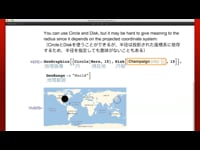 |
Brett Champion In this presentation, Brett Champion, Wolfram Research visualization manager, shows maps and the geographic data and entities available in the Wolfram Language and Mathematica 10. |
 |
During this talk you will get acquainted with a few of the new key features in SystemModeler 4.1 and 4.2, including model import from other types of modeling and simulation tools with ... |
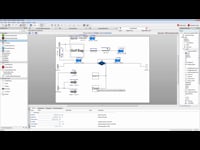 |
Learn about the flexibility of modeling in SystemModeler and how to construct one model that allows evaluation of many different systems and scenarios. |
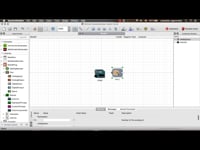 |
This presentation will show how to create simulation models that can be deployed to a Raspberry Pi that uses Arduino as an interface. |
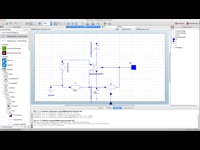 |
Learn how the engineering curriculum can be revitalized by making SystemModeler an integral part of the education experience. See how SystemModeler improves the way engineering courses are taught and demonstrate ... |
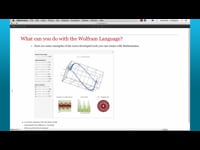 |
Nia Knibbs Vaughan This session will enable you to find what you can do with the Wolfram Language, and how to work with the Wolfram Language via the notebook interface. It also gives ... |
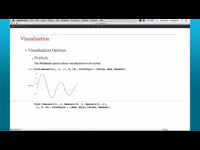 |
Nia Knibbs Vaughan Continuing from Part One of the series, Part Two focuses on more complex aspects, including vectors, data analysis, visualizations, and statistical analysis. |
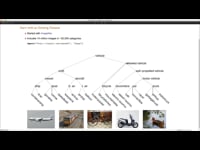 |
S. Bodenstein Get the basics of neural networks and applications such as image/speech recognition, image captioning, question answering, and game playing. A case study of the ImageIdentify built-in Wolfram Language symbol ... |
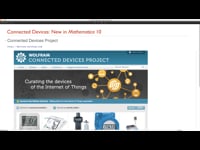 |
L. Chao & N. Lochner Learn to write a Wolfram Device Framework driver, collect/analyze sensor data and programmatically control actuators, motors, and indicators with devices. Examples include LibraryLink, WSTP, J/Link, device libraries and ... |
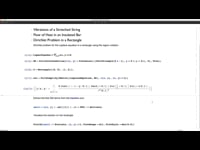 |
D. Kapadia & O. Ruebenkoenig Solving partial differential equations both symbolically and numerically in the Wolfram Language. Learn about specification of PDEs, boundary conditions, regions, and new functionality like eigensystem computation. |
 |
A. Rose Dispel the stereotype that you have to be a programmer to access powerful teaching tools. This talk will show you how to use the Wolfram Technology Stack to engage your ... |
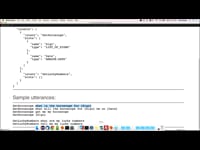 |
T. Gayley Amazon Echo is a connected, voice command device that this talk will use with the Wolfram Development Platform to develop simple but useful "skills," including a word game and time-tracker. ... |
 |
N. Zitzmann With the Wolfram Cloud app, you can view, edit, and run evaluations on Wolfram Language notebooks and most Cloud objects from your iPad, iPhone or even your Apple Watch. We ... |
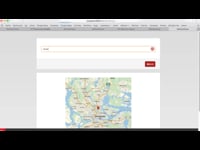 |
C. Barbieri & R. Di Virgilio How do you create a complex web app? What tools are there for advanced web programming? This talk looks at our latest efforts that make it possible to develop and ... |
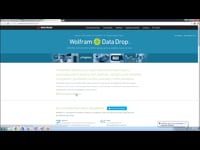 |
B. Espigule-Pons & B. Sandheinrich Learn how to get started with Wolfram Data Drop, utilize data accumulation from IFTTT trigger channels in the Wolfram Cloud, and give examples using social media platforms and apps. |
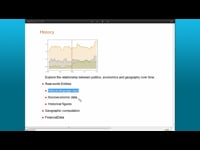 |
Learn how to incorporate the Wolfram Language into your course preparations and how to engage students with cloud-based resources that provide a limitless supply of relatable, real-world data for teaching ... |
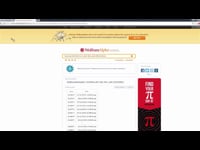 |
The full event archive recording includes how to get started with the Wolfram Data Drop, access mobile app data, work collaboratively using connected devices, and use the Wolfram Data Drop ... |
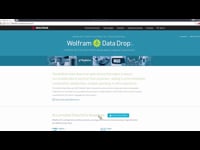 |
This introduction to the Wolfram Data Drop covers the basics, from logging in for the first time to working with your data. Learn how to set up databins for different ... |
 |
The Wolfram Data Drop makes accumulating data easy, setting it up for immediate computation or analysis. This presentation walks you through a sample project using data collected on a mobile ... |
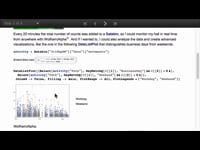 |
This presentation explores collaborative activities using the bundled Wolfram Language system on your Raspberry Pi, including making a time-lapse video and taking data from sensors and adding it to the ... |